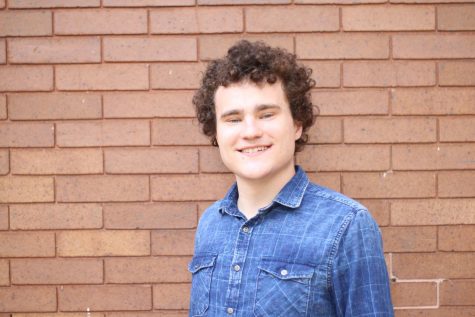After 37 years, Night of the Living Dread goes off the air
September 13, 2019
For 37 years, 31 of them on WRUW, Rich Lowe has been playing obscure 45 records and gushing about reggae artists who often never left the island nation that birthed the genre. On Friday, Sept. 6, Lowe signed on for the last time at 7 p.m. for a special two-hour broadcast of “Night of the Living Dread” outside of Mather Memorial Courtyard.
The outdoor DJ set gave listeners the chance to relax and say goodbye to a mainstay of Cleveland radio in person. It felt like a family giving their last regards to a relative moving away; Lowe is not retiring from reggae—his podcast and website ReggaeJamaicaWay will continue to provide a platform for Lowe—but a podcast lacks the attachment to place that a radio station has. The gothic architecture of Mather could have given the event the feeling of a funeral, but instead, it was a celebration of Lowe’s time in Cleveland.
“I think we’ll see you again,” said Filthy Rich, a member of the WRUW tech group that helped set up the event.
At WRUW, Lowe played a key part in getting the transmitter upgraded to 15,000 watts in 2002. He worked for the Cuyahoga County government, and was able to navigate the bureaucracy necessary to set up a transmitter tower.
One listener, Mel Fernandez, started following Lowe when he moved to Cleveland from Zimbabwe 25 years ago.
“He is a fountain of knowledge,” said Fernandez. “He knows all the artists, has spoken to a lot of them and knows all the history.”
His last set effortlessly displayed the diversity within the genre, shifting from the doo-wop that inspired the originators of the reggae, to electronic dub, classics and even punk music inspired by the signature sound of Jamaica.
Lowe has interviewed hundreds of artists over the years, from classic fifties singers, to radio DJs and musicians. He has four main secrets for interviewing: never ask the big questions up-front, never act like you’ve lost it, talk to people for as long as you can and never ask the obvious question.
“There was a guy who sounded just like Beres Hammond (famous 90s singer known for his Lovers Rock style). His name was Glenn Washington,” said Lowe. “In that interview, I’m never gonna ask him about Beres Hammond. Don’t ask the obvious question because they’ll be waiting for you to ask that question, and that creates a very positive tension that allows you to be genuine to that person.”
Lowe has recently focused on preserving the history of Jamaican music. His book about the late Lloyd Daley, a legendary record producer who pushed the genre in a more socially conscious direction will be released in the next few months.
“The golden era of reggae music was the 1950s,” said Lowe. “If you were 20 in the 50s, you’re almost 90 now. The whole generation, I hate to say it, is passing away. One of my goals is to gather some great gems of information about Jamaican culture and communicate them.”
How did a self-described white kid who stole his brother’s fake ID to get into clubs grow to earn the respect of so many Jamaican artists?
“You have to drink the beer, eat the food and after a while, you can gain their trust,” said Lowe. “I’m always respectful, always respectful. This is important to me, so I don’t mess around. There’s a saying in Jamaica that you have to live good. People can sense that.”
David Smeltz, the founder of one of Cleveland’s first reggae bands, I-Tal, said Lowe promoted local bands and events important to the West Indian community when no one else did.
“He gave credit to where credit was due,” said Smeltz. “That being, to the Jamaican musicians and community that created it.”
The last song Rich Lowe played on WRUW was “I’m Still Waiting” by Delroy Wilson. The final line on the last “Night of the Living Dread” is Wilson asking with fear in his voice, “Do you really love me, too?”
The smiling faces, shared memories and emotional goodbyes answered, “Cleveland loves you too, Rich Lowe. Cleveland loves you too.”



